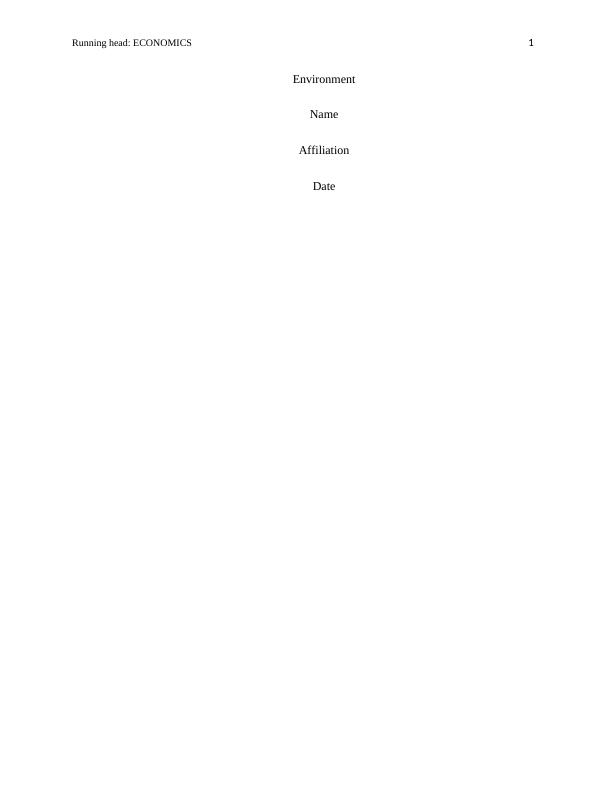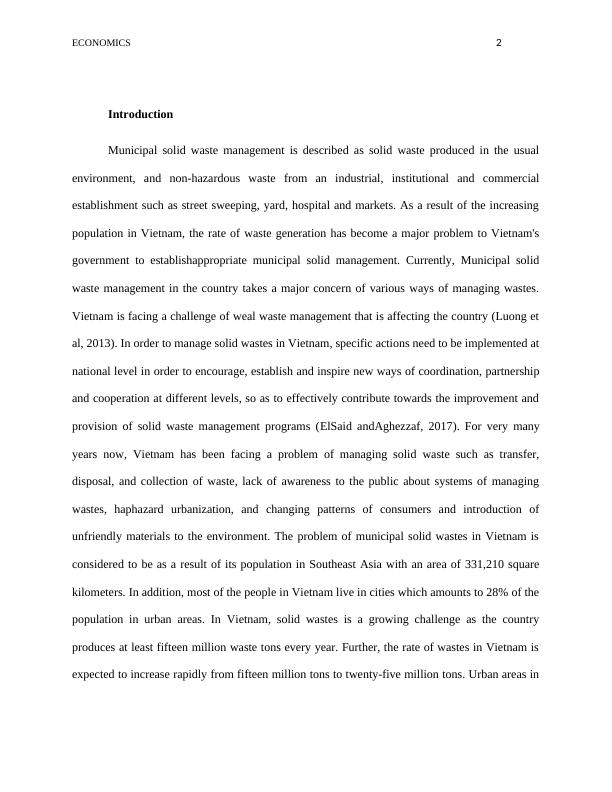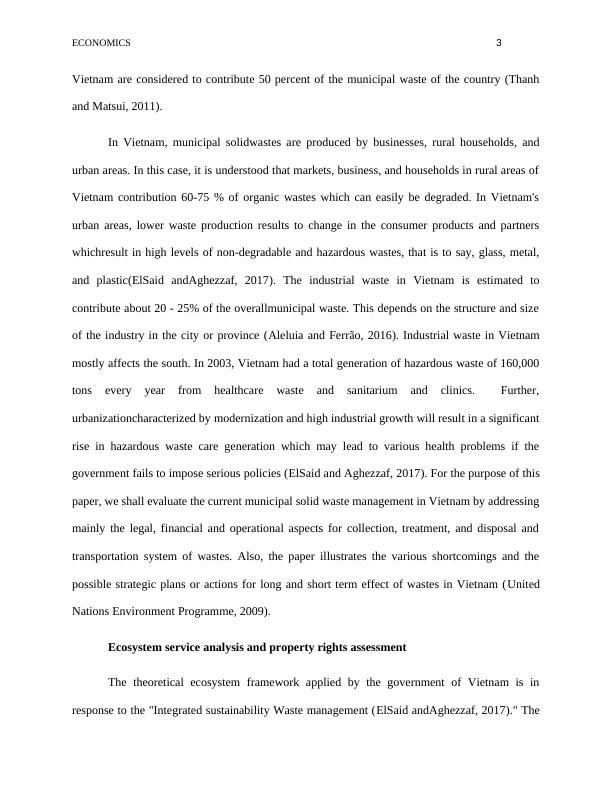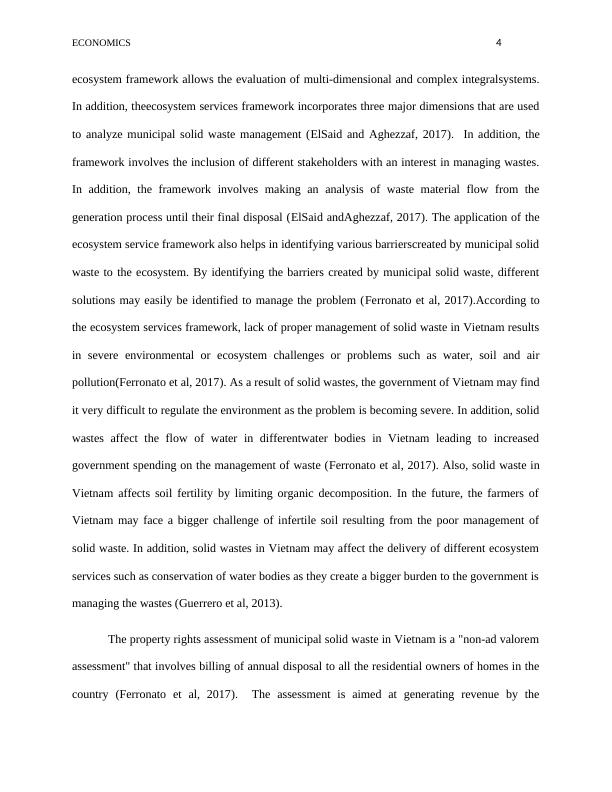Current Municipal Solid Waste Management in Vietnam
13 Pages3684 Words429 Views
Added on 2023-06-05
About This Document
This article discusses the current municipal solid waste management in Vietnam, including the challenges faced by the government, ecosystem service analysis, property rights assessment, and current regulatory and policy mechanisms. It also appraises the current frameworks and suggests opportunities for improvement.
Current Municipal Solid Waste Management in Vietnam
Added on 2023-06-05
ShareRelated Documents
Running head: ECONOMICS 1
Environment
Name
Affiliation
Date
Environment
Name
Affiliation
Date

ECONOMICS 2
Introduction
Municipal solid waste management is described as solid waste produced in the usual
environment, and non-hazardous waste from an industrial, institutional and commercial
establishment such as street sweeping, yard, hospital and markets. As a result of the increasing
population in Vietnam, the rate of waste generation has become a major problem to Vietnam's
government to establishappropriate municipal solid management. Currently, Municipal solid
waste management in the country takes a major concern of various ways of managing wastes.
Vietnam is facing a challenge of weal waste management that is affecting the country (Luong et
al, 2013). In order to manage solid wastes in Vietnam, specific actions need to be implemented at
national level in order to encourage, establish and inspire new ways of coordination, partnership
and cooperation at different levels, so as to effectively contribute towards the improvement and
provision of solid waste management programs (ElSaid andAghezzaf, 2017). For very many
years now, Vietnam has been facing a problem of managing solid waste such as transfer,
disposal, and collection of waste, lack of awareness to the public about systems of managing
wastes, haphazard urbanization, and changing patterns of consumers and introduction of
unfriendly materials to the environment. The problem of municipal solid wastes in Vietnam is
considered to be as a result of its population in Southeast Asia with an area of 331,210 square
kilometers. In addition, most of the people in Vietnam live in cities which amounts to 28% of the
population in urban areas. In Vietnam, solid wastes is a growing challenge as the country
produces at least fifteen million waste tons every year. Further, the rate of wastes in Vietnam is
expected to increase rapidly from fifteen million tons to twenty-five million tons. Urban areas in
Introduction
Municipal solid waste management is described as solid waste produced in the usual
environment, and non-hazardous waste from an industrial, institutional and commercial
establishment such as street sweeping, yard, hospital and markets. As a result of the increasing
population in Vietnam, the rate of waste generation has become a major problem to Vietnam's
government to establishappropriate municipal solid management. Currently, Municipal solid
waste management in the country takes a major concern of various ways of managing wastes.
Vietnam is facing a challenge of weal waste management that is affecting the country (Luong et
al, 2013). In order to manage solid wastes in Vietnam, specific actions need to be implemented at
national level in order to encourage, establish and inspire new ways of coordination, partnership
and cooperation at different levels, so as to effectively contribute towards the improvement and
provision of solid waste management programs (ElSaid andAghezzaf, 2017). For very many
years now, Vietnam has been facing a problem of managing solid waste such as transfer,
disposal, and collection of waste, lack of awareness to the public about systems of managing
wastes, haphazard urbanization, and changing patterns of consumers and introduction of
unfriendly materials to the environment. The problem of municipal solid wastes in Vietnam is
considered to be as a result of its population in Southeast Asia with an area of 331,210 square
kilometers. In addition, most of the people in Vietnam live in cities which amounts to 28% of the
population in urban areas. In Vietnam, solid wastes is a growing challenge as the country
produces at least fifteen million waste tons every year. Further, the rate of wastes in Vietnam is
expected to increase rapidly from fifteen million tons to twenty-five million tons. Urban areas in

ECONOMICS 3
Vietnam are considered to contribute 50 percent of the municipal waste of the country (Thanh
and Matsui, 2011).
In Vietnam, municipal solidwastes are produced by businesses, rural households, and
urban areas. In this case, it is understood that markets, business, and households in rural areas of
Vietnam contribution 60-75 % of organic wastes which can easily be degraded. In Vietnam's
urban areas, lower waste production results to change in the consumer products and partners
whichresult in high levels of non-degradable and hazardous wastes, that is to say, glass, metal,
and plastic(ElSaid andAghezzaf, 2017). The industrial waste in Vietnam is estimated to
contribute about 20 - 25% of the overallmunicipal waste. This depends on the structure and size
of the industry in the city or province (Aleluia and Ferrão, 2016). Industrial waste in Vietnam
mostly affects the south. In 2003, Vietnam had a total generation of hazardous waste of 160,000
tons every year from healthcare waste and sanitarium and clinics. Further,
urbanizationcharacterized by modernization and high industrial growth will result in a significant
rise in hazardous waste care generation which may lead to various health problems if the
government fails to impose serious policies (ElSaid and Aghezzaf, 2017). For the purpose of this
paper, we shall evaluate the current municipal solid waste management in Vietnam by addressing
mainly the legal, financial and operational aspects for collection, treatment, and disposal and
transportation system of wastes. Also, the paper illustrates the various shortcomings and the
possible strategic plans or actions for long and short term effect of wastes in Vietnam (United
Nations Environment Programme, 2009).
Ecosystem service analysis and property rights assessment
The theoretical ecosystem framework applied by the government of Vietnam is in
response to the "Integrated sustainability Waste management (ElSaid andAghezzaf, 2017)." The
Vietnam are considered to contribute 50 percent of the municipal waste of the country (Thanh
and Matsui, 2011).
In Vietnam, municipal solidwastes are produced by businesses, rural households, and
urban areas. In this case, it is understood that markets, business, and households in rural areas of
Vietnam contribution 60-75 % of organic wastes which can easily be degraded. In Vietnam's
urban areas, lower waste production results to change in the consumer products and partners
whichresult in high levels of non-degradable and hazardous wastes, that is to say, glass, metal,
and plastic(ElSaid andAghezzaf, 2017). The industrial waste in Vietnam is estimated to
contribute about 20 - 25% of the overallmunicipal waste. This depends on the structure and size
of the industry in the city or province (Aleluia and Ferrão, 2016). Industrial waste in Vietnam
mostly affects the south. In 2003, Vietnam had a total generation of hazardous waste of 160,000
tons every year from healthcare waste and sanitarium and clinics. Further,
urbanizationcharacterized by modernization and high industrial growth will result in a significant
rise in hazardous waste care generation which may lead to various health problems if the
government fails to impose serious policies (ElSaid and Aghezzaf, 2017). For the purpose of this
paper, we shall evaluate the current municipal solid waste management in Vietnam by addressing
mainly the legal, financial and operational aspects for collection, treatment, and disposal and
transportation system of wastes. Also, the paper illustrates the various shortcomings and the
possible strategic plans or actions for long and short term effect of wastes in Vietnam (United
Nations Environment Programme, 2009).
Ecosystem service analysis and property rights assessment
The theoretical ecosystem framework applied by the government of Vietnam is in
response to the "Integrated sustainability Waste management (ElSaid andAghezzaf, 2017)." The

ECONOMICS 4
ecosystem framework allows the evaluation of multi-dimensional and complex integralsystems.
In addition, theecosystem services framework incorporates three major dimensions that are used
to analyze municipal solid waste management (ElSaid and Aghezzaf, 2017). In addition, the
framework involves the inclusion of different stakeholders with an interest in managing wastes.
In addition, the framework involves making an analysis of waste material flow from the
generation process until their final disposal (ElSaid andAghezzaf, 2017). The application of the
ecosystem service framework also helps in identifying various barrierscreated by municipal solid
waste to the ecosystem. By identifying the barriers created by municipal solid waste, different
solutions may easily be identified to manage the problem (Ferronato et al, 2017).According to
the ecosystem services framework, lack of proper management of solid waste in Vietnam results
in severe environmental or ecosystem challenges or problems such as water, soil and air
pollution(Ferronato et al, 2017). As a result of solid wastes, the government of Vietnam may find
it very difficult to regulate the environment as the problem is becoming severe. In addition, solid
wastes affect the flow of water in differentwater bodies in Vietnam leading to increased
government spending on the management of waste (Ferronato et al, 2017). Also, solid waste in
Vietnam affects soil fertility by limiting organic decomposition. In the future, the farmers of
Vietnam may face a bigger challenge of infertile soil resulting from the poor management of
solid waste. In addition, solid wastes in Vietnam may affect the delivery of different ecosystem
services such as conservation of water bodies as they create a bigger burden to the government is
managing the wastes (Guerrero et al, 2013).
The property rights assessment of municipal solid waste in Vietnam is a "non-ad valorem
assessment" that involves billing of annual disposal to all the residential owners of homes in the
country (Ferronato et al, 2017). The assessment is aimed at generating revenue by the
ecosystem framework allows the evaluation of multi-dimensional and complex integralsystems.
In addition, theecosystem services framework incorporates three major dimensions that are used
to analyze municipal solid waste management (ElSaid and Aghezzaf, 2017). In addition, the
framework involves the inclusion of different stakeholders with an interest in managing wastes.
In addition, the framework involves making an analysis of waste material flow from the
generation process until their final disposal (ElSaid andAghezzaf, 2017). The application of the
ecosystem service framework also helps in identifying various barrierscreated by municipal solid
waste to the ecosystem. By identifying the barriers created by municipal solid waste, different
solutions may easily be identified to manage the problem (Ferronato et al, 2017).According to
the ecosystem services framework, lack of proper management of solid waste in Vietnam results
in severe environmental or ecosystem challenges or problems such as water, soil and air
pollution(Ferronato et al, 2017). As a result of solid wastes, the government of Vietnam may find
it very difficult to regulate the environment as the problem is becoming severe. In addition, solid
wastes affect the flow of water in differentwater bodies in Vietnam leading to increased
government spending on the management of waste (Ferronato et al, 2017). Also, solid waste in
Vietnam affects soil fertility by limiting organic decomposition. In the future, the farmers of
Vietnam may face a bigger challenge of infertile soil resulting from the poor management of
solid waste. In addition, solid wastes in Vietnam may affect the delivery of different ecosystem
services such as conservation of water bodies as they create a bigger burden to the government is
managing the wastes (Guerrero et al, 2013).
The property rights assessment of municipal solid waste in Vietnam is a "non-ad valorem
assessment" that involves billing of annual disposal to all the residential owners of homes in the
country (Ferronato et al, 2017). The assessment is aimed at generating revenue by the

End of preview
Want to access all the pages? Upload your documents or become a member.
Related Documents
Solid Waste Management of Aftabnagar (Dhaka)lg...
|11
|1640
|39
Solid Waste Management in Malaysialg...
|15
|4216
|85
Rural Solid Waste Management PDFlg...
|18
|3306
|33
Waste Management in Malaysialg...
|10
|2850
|1
ENGR 41230 - Hazard Waste Managementlg...
|10
|2508
|151
Department of Geography & the Environmentlg...
|5
|845
|27
